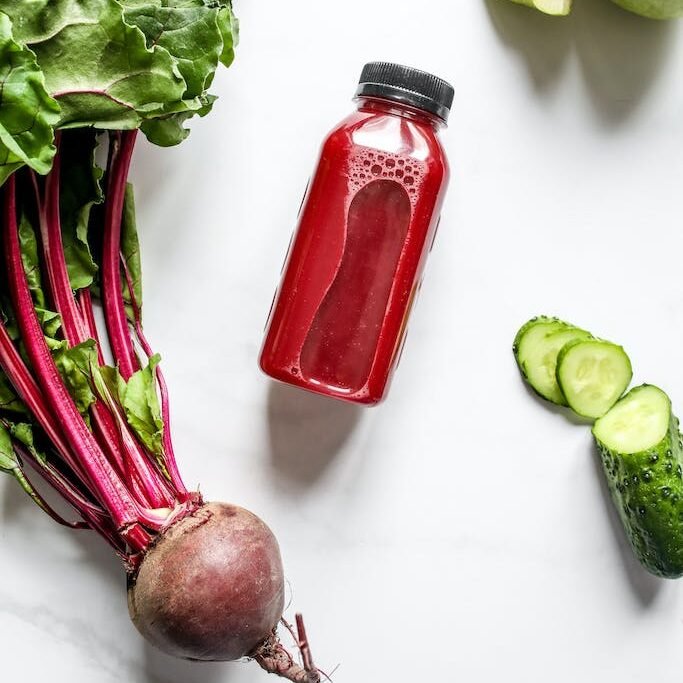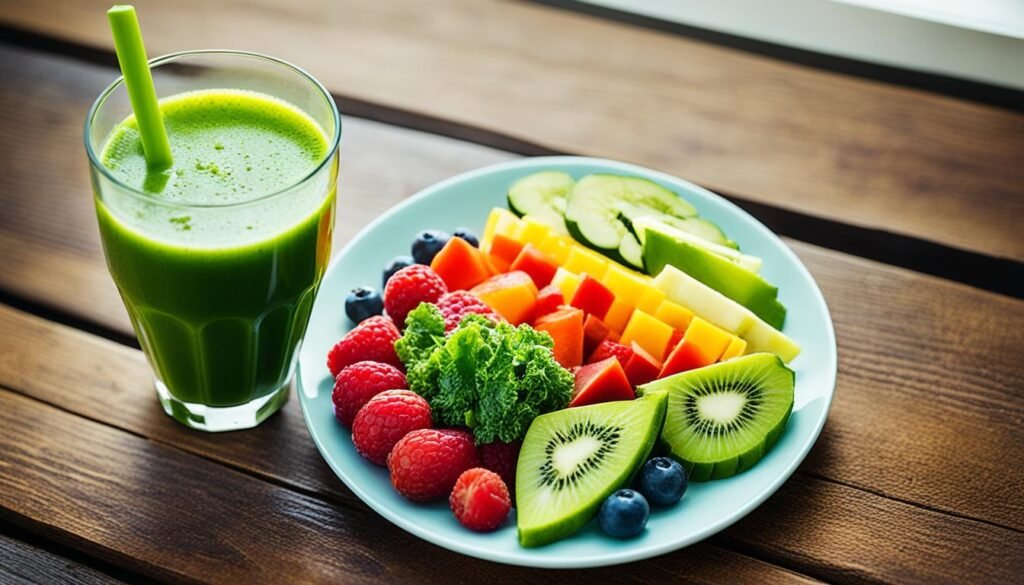Get our FREE E-Book HERE - 120 TIPS for Losing Weight & Bonus Tips for Postpartum Weight Loss & Dad’s Postpartum Experience
How to Lower Liver Enzymes Naturally – Tips & Strategies


Welcome to our article on how to lower liver enzymes naturally. Your liver plays a vital role in maintaining overall health and well-being. It performs many important functions, including the production of enzymes that aid digestion and detoxification. However, certain factors can cause elevated levels of liver enzymes, which can indicate liver damage or dysfunction.
If you’re looking for natural remedies to lower your liver enzymes and boost liver health, you’ve come to the right place. In this article, we will provide you with valuable tips and strategies to help you on your journey towards optimal liver health. By incorporating these strategies into your lifestyle, you can support your liver’s natural detoxification processes and promote overall well-being.
Key Takeaways:
- Lowering liver enzymes naturally is crucial for maintaining optimal liver health.
- Understanding the role of liver enzymes, such as alanine aminotransferase (ALT), can help you monitor liver health.
- Elevated liver enzyme levels can be caused by various factors, including non-alcoholic fatty liver disease (NAFLD), hepatitis, and certain medications.
- Complementary natural methods can be used alongside medical treatments to support liver health.
- A healthy diet, regular exercise, and lifestyle modifications are key to reducing liver enzymes and sustaining liver health in the long term.
Understanding Liver Enzymes and Natural Remedies
In order to maintain optimal liver health, it is important to have a thorough understanding of liver enzymes and their role in the body. One particular enzyme, alanine aminotransferase (ALT), can provide valuable insights into the health of your liver. ALT levels are often used as a marker for liver damage or dysfunction.
Role of Alanine Aminotransferase (ALT) in Liver Health
Alanine aminotransferase (ALT) is an enzyme primarily found in liver cells. When liver cells are damaged or inflamed, ALT is released into the bloodstream, leading to elevated ALT levels. Monitoring ALT levels can help in identifying liver issues such as non-alcoholic fatty liver disease (NAFLD), hepatitis, or adverse reactions to medications or supplements. Regular testing of ALT levels can provide valuable information about the overall health of your liver.
Major Causes Leading to Elevated Liver Enzyme Levels
Elevated liver enzyme levels can be caused by various factors. Non-alcoholic fatty liver disease (NAFLD), characterized by an accumulation of fat in the liver, is one of the leading causes of elevated liver enzymes. Hepatitis, both viral and autoimmune, can also lead to increased enzyme levels. Additionally, certain medications or supplements have the potential to cause liver damage and elevate liver enzymes. It is important to be aware of these causes and take necessary measures to protect liver health.
Complementary Natural Methods for Medical Treatments
While medical treatments play a crucial role in addressing liver issues, there are also natural remedies that can complement these treatments and support liver health. Incorporating lifestyle changes such as maintaining a healthy diet, exercising regularly, and managing stress can have a positive impact on liver function. Certain natural substances such as milk thistle, turmeric, and dandelion root have been traditionally used to promote liver health. Before incorporating natural remedies, it is crucial to consult with a healthcare professional to ensure their safety and effectiveness.
Understanding liver enzymes and their significance is essential for maintaining liver health. By monitoring ALT levels and addressing the major causes of elevated liver enzyme levels, you can take proactive steps towards supporting your liver’s well-being. Complementary natural methods, when used alongside medical treatments, can provide additional support and promote overall liver health.
How to Lower Liver Enzymes Through Diet
Incorporating certain foods into your diet can have a significant impact on lowering liver enzymes naturally. These dietary changes can support liver health and promote the reduction of liver enzymes. Discover the beneficial effects of the following foods and beverages:
The Impact of Coffee
Coffee lovers can rejoice! Studies have shown that coffee consumption may be associated with a decreased risk of liver disease and reduced liver enzyme levels. So go ahead and enjoy your morning cup of joe, knowing that it may contribute to liver health.
Drink Tea
Tea, especially green tea and herbal varieties, is packed with antioxidants that can benefit liver health. Regular consumption of tea has been linked to lower liver enzyme levels and improved liver function. So sip on a soothing cup of tea to support your liver.
Include Blueberries and Cranberries
These vibrant berries are rich in antioxidants and polyphenols, which can help protect the liver from damage. Incorporating blueberries and cranberries into your diet may help lower liver enzyme levels and enhance liver health.
Grapefruit
Grapefruit contains compounds that can promote liver health and support the reduction of liver enzymes. Including grapefruit or its juice in your diet can have beneficial effects on liver function.
Eat Grapes
Like grapefruit, grapes are also beneficial for liver health. The antioxidants and polyphenols present in grapes can help reduce liver enzyme levels and support overall liver function.
Prickly Pear
The prickly pear fruit is known for its liver-protective properties. Regular consumption of prickly pear or its juice can aid in lowering liver enzyme levels and maintaining optimal liver health.
Beetroot Juice
Beetroot juice is a powerhouse of nutrients that can improve liver health. It contains antioxidants and betalains, which support liver detoxification and help lower liver enzyme levels.

Eat Cruciferous Vegetables with Every Meal
Cruciferous vegetables such as broccoli, cauliflower, and Brussels sprouts are excellent choices for liver health. These vegetables are rich in fiber, vitamins, and antioxidants that can assist in lowering liver enzyme levels and promoting overall liver function.
Walnuts
Walnuts are packed with omega-3 fatty acids and antioxidants that can benefit liver health. Incorporating walnuts into your diet can contribute to lower liver enzyme levels and improved liver function.
Foods High in Folic Acid
Folic acid, also known as vitamin B9, plays a crucial role in liver function. Including foods such as leafy greens, beans, citrus fruits, and fortified cereals that are high in folic acid can support liver health and help lower liver enzyme levels.
Fish
Fatty fish like salmon, mackerel, and sardines are excellent sources of omega-3 fatty acids, which can promote liver health and reduce liver enzyme levels. Including fish in your diet can have beneficial effects on liver function.
Olive Oil
Replace saturated fats with heart-healthy olive oil to support liver health. Olive oil contains antioxidants and anti-inflammatory properties that can help lower liver enzyme levels and improve overall liver function.

Lifestyle Modifications for Liver Enzyme Reduction
To lower liver enzymes naturally, certain lifestyle modifications are essential. Incorporating these changes into your daily routine can have a positive impact on your liver health. Two key lifestyle modifications for reducing liver enzymes are regular exercise and managing cholesterol levels.
Exercise and Lower Liver Enzymes: Making the Connection
Regular exercise plays a crucial role in promoting liver health and reducing liver enzymes. Engaging in physical activity helps improve blood flow to the liver, which aids in its detoxification process and facilitates the removal of harmful substances. Additionally, exercise supports weight management, prevents fatty liver disease, and helps regulate insulin sensitivity, all of which contribute to healthier liver enzyme levels.

Cholesterol and Liver Health: What You Need to Know
Managing cholesterol levels is another important aspect of liver health. High cholesterol levels can contribute to liver damage and increase the risk of fatty liver disease. To maintain optimal liver function and reduce liver enzymes, it is crucial to focus on managing cholesterol levels. This can be achieved through a combination of dietary modifications, regular exercise, and medical advice, if necessary.
Conclusion
To maintain optimal liver health, it is crucial to prioritize regular testing and understanding your liver enzyme results. Regular testing allows for early detection of any abnormalities and enables prompt intervention if needed. By staying informed about your liver enzyme levels, you can make informed decisions about your lifestyle and take the necessary steps to protect your liver.
A holistic approach is key to achieving and maintaining liver health. This involves combining a healthy diet, regular exercise, and seeking medical advice when necessary. A balanced diet rich in liver-healthy foods such as blueberries, walnuts, and olive oil, coupled with regular exercise, can work synergistically to support your liver function. Additionally, consulting with medical professionals and following their advice will ensure that you receive personalized guidance and treatments tailored to your specific needs.
Sustaining liver health is a long-term commitment that requires consistency and dedication. Implementing healthy habits into your daily routine, such as eating nutritious foods, staying physically active, and maintaining regular medical check-ups, is essential for the well-being of your liver. By adopting a proactive mindset and prioritizing the health of your liver, you are taking an active role in safeguarding your overall health and quality of life.








